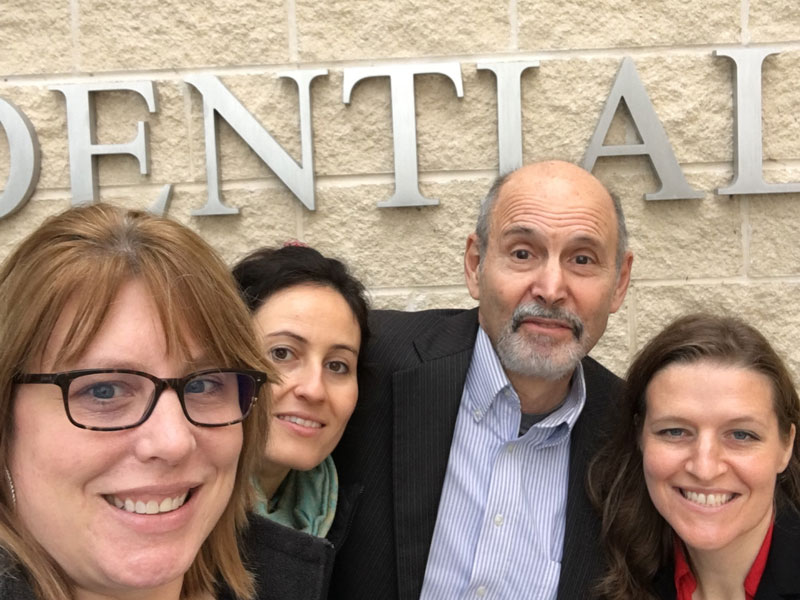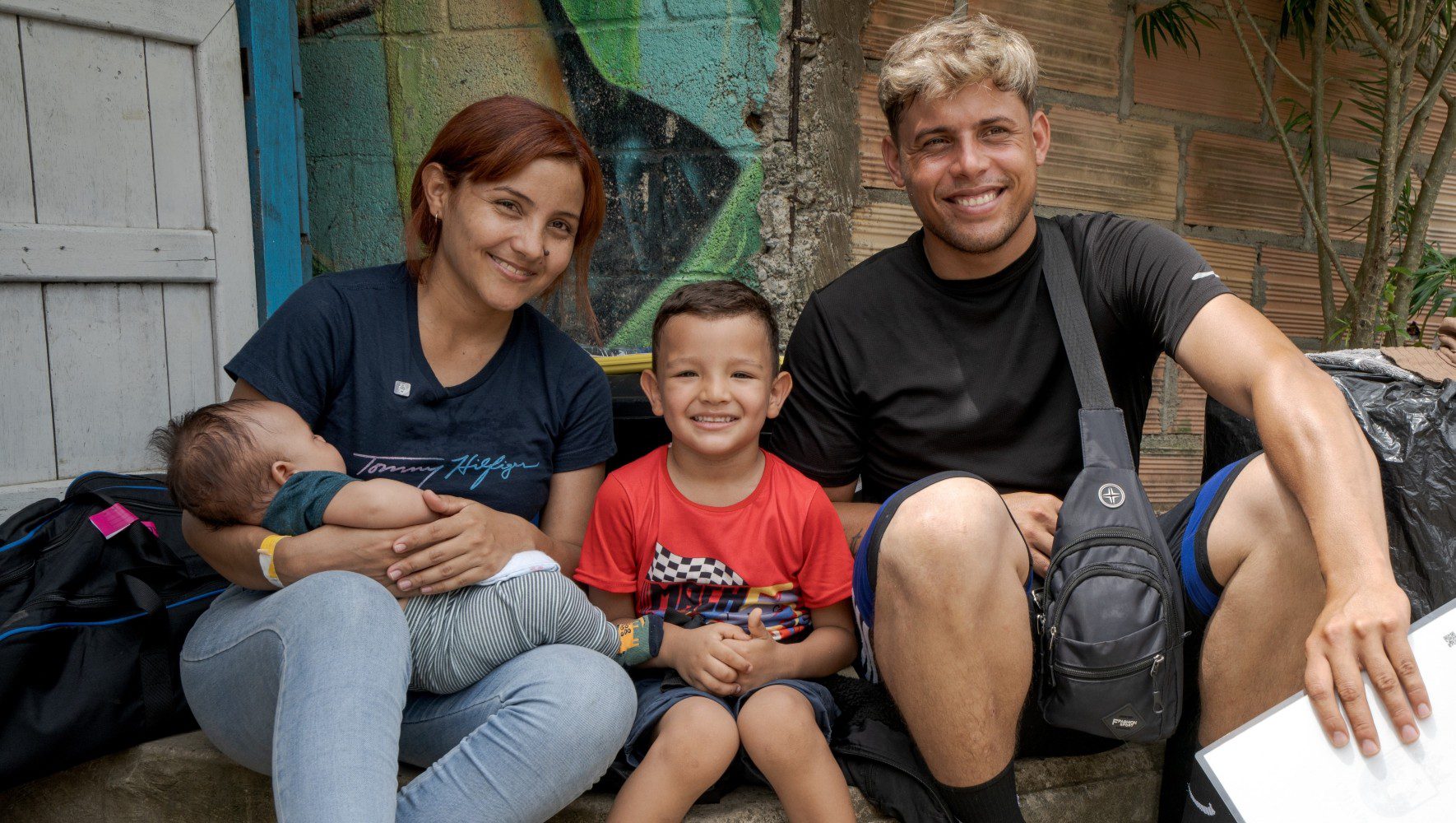Pro Bono Trip Helps Fathers and Sons Detained at the Border
By Sharon Samber, HIAS.org
Jan 11, 2019

HIAS staff and volunteer attorneys Sue Kenney-Pfalzer, Andrea Carcamo-Cavazos, David Gottlieb, and K. Louise Moss, led a delegation to help asylum seekers at the Karnes Detention Facility in Texas, December 2018.
(HIAS)
Last month HIAS Associate Director, Initial Resettlement, U.S. Programs Sue Kenney-Pfalzer and Staff Attorney Andrea Carcamo-Cavazos led a delegation of pro bono attorneys to the Karnes County Residential Center in Texas. The delegation included David Gottlieb, a professor at Wake Forest University School of Law, and K. Louise Moss, an immigration attorney in Baltimore.
Inside the Karnes family detention facility, about an hour southeast of San Antonio, Texas, fathers and sons sit and wait.
Many of these men were fleeing death threats by gangs such as MS-13.
“One man I met with was afraid because the gang had killed his brother for refusing to join them and now they were after him to join,” recounted Andrea Carcamo-Cavazos. “They even threatened to make his oldest son join the gang if he refused. Others were being extorted by the gangs and when they couldn’t afford to pay what the gang demanded, their lives were threatened.”
Stories like these were told and retold as HIAS led another delegation of staff and volunteers to the U.S.-Mexico border to provide legal services to asylum seekers. On this trip HIAS provided services through RAICES, a Texas non-profit organization that runs the Karnes Pro Bono Project. Previous legal trips assessed the situation and went to help detainees in another center, and HIAS is placing Border Fellows in three non-profit legal organizations along the southern border to increase their capacity to provide legal representation to asylum seekers in and out of detention.
Most of the men the attorneys counseled were from Honduras and Guatemala, who came with children aged two to sixteen years old. Many of the detainees are extremely poor individuals from indigenous communities who had never been protected by the Guatemalan government; some spoke rare dialects for which it was hard to find interpreters.
“They left behind so much-- their family, and everything they knew,” said Carcamo-Cavazos.
Without the help of pro bono lawyers it seems unlikely the detainees would be able to navigate their way through a complicated legal system and successfully present their claims for asylum before U.S. immigration officials. The lawyers met with dozens of detainees.
To be released, detainees have to convince an asylum officer from the Department of Homeland Security that they have a reasonable or credible fear of persecution in their home country, depending on the particular situation and any previous deportations.
David Gottlieb said he learned how the fathers were raised in a world where they were taught to show strength. “Even those beaten or forced out at gunpoint by gang members after they were threatened with death did not always want to say anything that would smack of cowardice,” he said. “It was important for us, therefore, to let them know that terms like ‘credible fear of persecution’ did not indicate a lack of courage.”
The HIAS delegation helped fathers tell the relevant pieces of their stories to the asylum officers. If detainees fail the interview, they have an opportunity to go before an immigration judge to appeal this decision, and if the judge decides against them, they can file a motion to reconsider. The HIAS team also spent some time drafting declarations for appeal to submit to immigration judges.
“I saw in these fathers the same love and courage that I imagine my wife's parents showed more than 70 years ago as they carried her, at great risk, across Poland to Vienna in the aftermath of World War II,” Gottlieb said.
The lawyers assisted many of the fathers and sons by conducting initial intakes and providing them with "know your rights" talks ("charlas") before they were released either into the U.S. or deported.
Initial intakes were small group conversations about the legal services provided by RAICES and where information was gathered about individuals' experiences at the U.S. Customs and Border Protection (CBP) facilities-- commonly referred to by agents and immigrants as the "hielera" and "perrera" (ice box and kennel, respectively). At these locations the detainees said they were kept in rooms with the lights on 24/7 so they were unable to tell when it was night or day, and therefore could not say with certainty how long they were kept there.
On the one hand many of the fathers said they were treated well, and their children were going to school during the day. On the other hand, many of the children were sick. The team also was told of situations where they thought it possible that several officers were abusive toward some of the children and parents. Some attorneys spent time drafting the declarations of a child and his father whose treatment at the CBP facilities could rise to the level of torture.
During one meeting with a father, his 10-year old son was brought to him very upset because when the boy had come out of school his father wasn’t there. “The boy thought they had taken his father away and that he would never see him again,” Sue Kenney-Pfalzer said. “When the boy entered the room, he and his father hugged and cried. It was heartbreaking.”
K. Louise Moss estimates she met with 65 detained fathers to prepare them for their interviews. She realized many of them were using general terms for the reasons they want to immigrate, such as “for a better life” or “for work.” The families do not easily recognize that the circumstances in their home countries were actually traumatic, or they may have been embarrassed to share their experiences.
“One of the detained fathers I met with began to understand that the hateful treatment his son experienced in their home country are grounds for protection under U.S. asylum law,” Moss said.
Almost every father had a contact in the U.S. they could stay with once released, but many continue to wait to be released.



